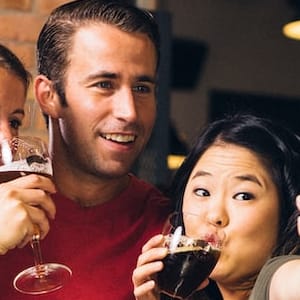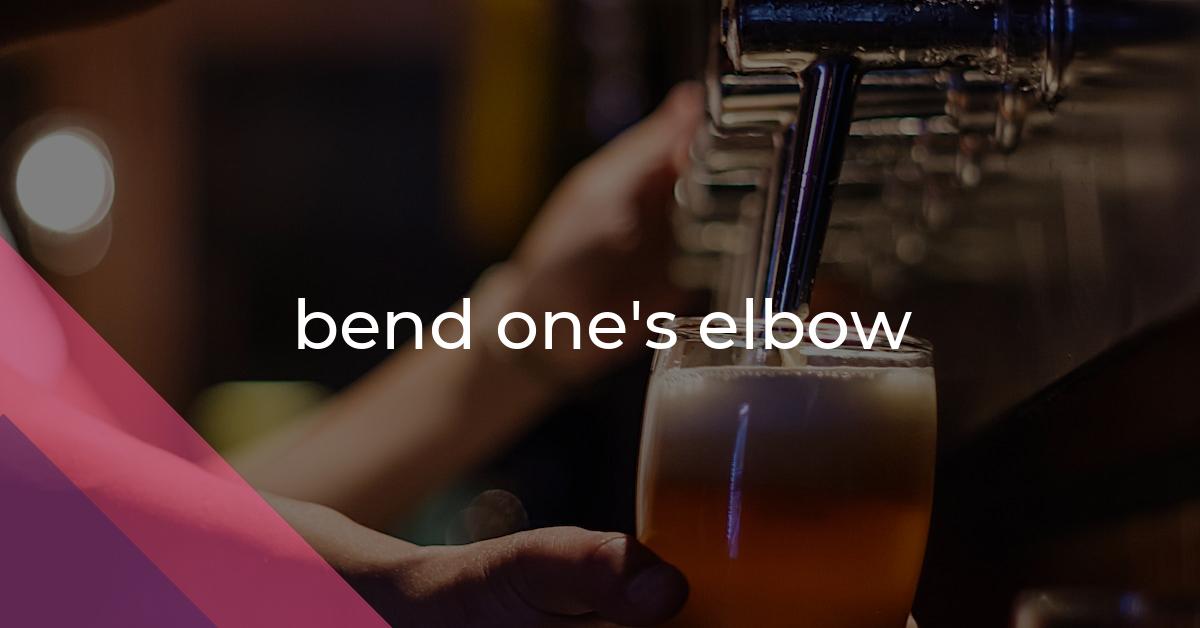bend one’s elbow: Idiom Meaning and Origin
What does ‘bend one's elbow’ mean?
The idiom "bend one's elbow" means to drink alcohol, specifically to consume alcoholic beverages.

Idiom Explorer
An idiom meaning to consume a large quantity of alcohol, usually resulting in getting drunk or excessively intoxicated.
The idiom "elbow mentality" refers to a competitive or aggressive attitude where individuals are determined to succeed at all costs, often using forceful or ruthless methods to get ahead.
The idiom "eat out of someone's hand" means to be completely under someone's control or influence, obeying their every command without question.
The idiom "dry out" means to stop drinking alcohol or to recover from alcoholism or drug addiction. It can also refer to the process of removing moisture from something or to take a break from a situation or activity.
The idiom "drink with the flies" means to consume alcohol alone or in a secretive, hidden manner. It implies a sense of isolation or sadness.
The idiom "drinking hole" refers to a place, often a bar or pub, where people gather to drink alcoholic beverages and socialize. It symbolizes a meeting point for individuals to relax and unwind.
The idiom "cry in one's beer" means to express one's unhappiness, frustration, or disappointment, typically in a public or self-pitying manner, often over something that cannot be changed.
The idiom "bust one's chops" means to criticize or tease someone in a harsh or relentless manner.
The idiom "bust one's balls" means to put in a lot of effort, work extremely hard, or push oneself to the limit to achieve a goal, often in a competitive or difficult situation.
The idiom "break one's neck" means to make an extreme effort or go to great lengths to accomplish something.
Unveiling the Elbow's Mystery
The idiom "bend one's elbow" is a playful and euphemistic way of describing the act of drinking alcohol. It is commonly used in colloquial American English and derives its meaning from the physical action of bending the arm at the elbow joint to bring a drink to one's mouth.
One interesting fact about this idiom is that it is a metaphorical expression, associating the physical action of bending one's elbow with the act of consuming alcohol. This metaphorical usage adds a playful tone to the phrase and offers an alternative way to refer to drinking.
Another noteworthy aspect of the idiom is its historical origins, believed to date back to the early 20th century in the United States. Although the exact origin remains uncertain, the popularity of the expression soared during the Prohibition era in the 1920s when the sale and consumption of alcoholic beverages were banned. At this time, people would gather discreetly in hidden underground bars known as speakeasies to partake in drinking, and the idiom "bend one's elbow" emerged as a euphemism for this illicit activity.
This idiom has also found its way into popular culture, frequently appearing in literature, film, and various forms of media. Its usage often conveys a casual and lighthearted tone and invokes a sense of camaraderie or conviviality associated with social drinking. The idiom can be used figuratively to refer to excessive or habitual alcohol consumption.
Considering the related idioms, "tie one on," "bend to one's will," and "bend someone's will" share a common theme of exerting influence or control over oneself or others. While these idioms may not have a direct semantic connection to "bend one's elbow," their usage underscores the versatility of the verb "bend" in conveying different actions and concepts.
The idiomatic expression "tie one on" typically denotes the act of getting drunk or heavily intoxicated. This idiom can be seen as an extension of the metaphorical use of "bend one's elbow," where the bending of the elbow to drink alcohol is taken to an extreme, resulting in a loss of control due to excessive consumption.
On the other hand, the idioms "bend to one's will" and "bend someone's will" share a common thread of influencing or yielding to someone's desires or demands. While these idioms do not directly refer to alcohol or drinking, their use of the verb "bend" suggests a sense of flexibility or acquiescence. In a figurative sense, one could interpret these idioms as bending one's metaphorical will in the same way that the elbow bends to bring a drink to the mouth.
The idiomatic expression "bend one's elbow" has become firmly entrenched in American English, offering a colorful and playful alternative to the straightforward phrase "drink alcohol." Its origins in the Prohibition era and its continued usage in contemporary times highlight the enduring nature of idioms and their ability to convey complex ideas through concise and metaphorical language. When considering related idioms such as "tie one on," "bend to one's will," and "bend someone's will," the versatility of the verb "bend" becomes apparent in its ability to convey different actions and concepts related to exerting influence or control.
Example usage
Examples of how the idiom "bend one's elbow" can be used in a sentence:
- He likes to bend his elbow and have a few drinks after work.
- She was in a relaxed mood and decided to bend her elbow at the local pub.
- Instead of studying for the exam, he chose to bend his elbow with his friends at a party.
More "Drinking" idioms



